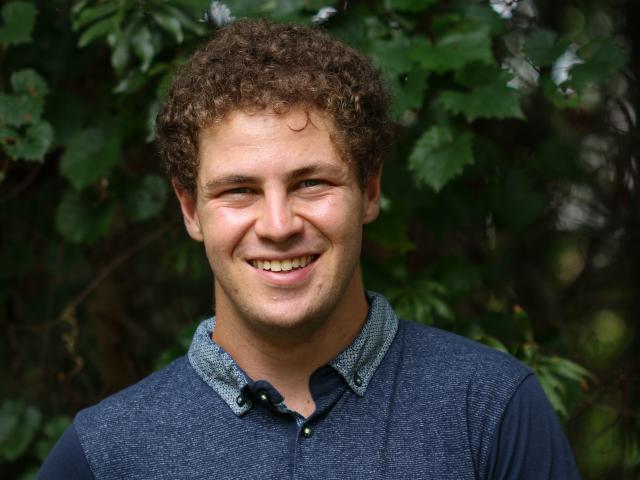Meet Noah Rubin (CCS Biology '17)
January 13, 2020
CCS Biology Alumnus Noah Rubin combines his passions for biology and engineering as a rehabilitation engineer

Photo of Noah Rubin
College of Creative Studies: How has CCS impacted your life?
Noah Rubin: CCS impacted my life in three tangible ways. First, the necessity to surround myself with people equally passionate and curious about being involved in their community and supporting their peers, but who are not necessarily like-minded. Second, a greater self-confidence to not be afraid to break systems in order to pursue my passion. Third, and most important, an immense gratitude for the people in my life who encourage me in that pursuit.
CCS: Why did you choose to come to CCS? How did you find out about the College?
NR: I found out about the college through my brother Adam; he was a senior in CCS Literature during my first year at CCS. When I applied to colleges, I was interested in biology, physics, and engineering; unclear which route to go towards. The College's biology program at the time offered an engineering concentration, and with the unique flexibility for course requirements, I had an opportunity to explore whatever engineering courses I was interested in while still gaining a strong biology background. The freedom that CCS offered to explore in tandem with close guidance from professors as direct mentors attracted me immensely to the College.
NR: The universal approach to academics and life as a community in an honest and transparent manner (as seen on the white boards in the CCS student lounge). Dean Tiffney always said: "We are not in competition against each other, but against ignorance." I don't know of any college that exemplified this mantra better than CCS.
Specifically to CCS, the exposure to research environments and practicing reading scientific papers as early as in my first and second years is something that retrospectively has helped immensely.
CCS: If you attended graduate school, where and what did you study as a graduate student? How did your CCS education help you excel as a graduate student?
NR: After taking a gap year teaching physics/math at UCSB's Campus Learning Assistance Services, I joined UNC Chapel Hill and NC State University's Joint Department for Biomedical Engineering. I'm currently in my second-year with a focus in rehabilitation engineering. My focus is on improving the interface between individuals with mobility impairment and assistive/rehabilitative devices via better estimation of movement intention while also analyzing muscle-nerve physiology in a noninvasive manner.
NR: My area within rehabilitation engineering is an interdisciplinary field applying knowledge of physics, electrical and mechanical engineering to biological systems. Because of the learning flexibility at CCS, I managed to get an unusually broad but effective background on these disciplines as an undergraduate. It made me a decent enough "jack of all trades" that I now have some grounding when facing most new day-to-day problems that have come up in grad school. Specifically to CCS, the exposure to research environments and practicing reading scientific papers as early as in my first and second years is something that retrospectively has helped immensely.
CCS: Does a memorable moment stand out from your time at CCS? If so, please describe the moment.
NR: There are many, but one that comes to mind was in my first quarter in the CCS Biology Colloquium with the other first years and transfers. If I remember correctly, we had around 24 students and 6 professors sitting in a room chatting every week. One week we went through a bunch of professors' websites, discussed their research, how it relates to each person's interests, and what labs may be good fits to join. Looking back on it, the willingness for them to go through the small but vital nitty-gritty details, laying out the real picture of navigating university resources so early on, with all the professors together bouncing ideas off each other and with us, is extremely unusual. At some point, Professor Stu Feinstein made the comment that has always stuck with me: "Begin to look at yourselves not as students but as junior colleagues." The level of respect they had for us, only a few weeks into my first year, is something I will always appreciate and admire.
Professor Stu Feinstein made the comment that has always stuck with me: "Begin to look at yourselves not as students but as junior colleagues." The level of respect they had for us, only a few weeks into my first year, is something I will always appreciate and admire.
CCS: What advice would you give to current and future CCS students?
NR: There are far too many resources at a university which is why you will always meet so many different but equally passionate people. Once you find your niche, dive in and try your best to prevent tunnel vision, take some interdisciplinary classes, and get uncomfortable outside of your field. This is the best time for you to dip your toes everywhere. You will not know whether you really are passionate about an interest until you pursue it fully. Experience is very different from expectation so go in open-minded and don't ever feel stuck.
CCS: Anything else you would like to share about CCS/UCSB?
NR: If it has been more than a week since you've spent an hour at the beach (or 15 minutes, I know it's hectic), you've been away too long from that resource. In 30 years you're always going to wish you went more, even if you go all the time.